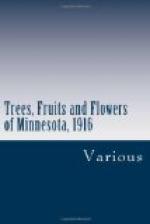Perennials.—Aconite (Napellus); Balm (Bee-balm); Brake; Carnation (Bizarre Dianthus caryophyllus); Clover (Crimson Trifolium incarnatus); Columbine (Aquilegia vulgaris); Cowslip (Primula veris); Crowflower (Ragged Robin, Lychnis floscuculi); Cuckoo Buds (Butter cups, Ranunculus acris); Daisies (Bellis perennis); Eryngium M. (Sea Holly); Flax; Flower de luce (Iris Germanica, blue); Fumitory (Dicentra spectabilis; Bleeding Heart); Harebell (Campanula rotundifolia); Larksheel (Delphinium elatum, Bee Larkspur); Peony; Pinks (Dianthus Plumarius); Violet (Viola Odorata).
Roses.—Brier (Eglantine Rose), Provencal (Cabbage Rose), Musk, Damask, White Provence, York and Lancaster.
For appropriate quotations to mark each flower the little book, “Shakespeare’s Garden,” by J.H. Bloom, will be found very helpful. Our other authorities have been Biesley and L. Grindon, all of which are in the Public Library.
MRS. N. S. SAWYER.
MRS. E. W. GOULD.
ENTOMOLOGICAL NOTES
By F. L. WASHBURN, Professor of Entomology, University
of
Minnesota.
SUGGESTIONS TO PARTIES PLANNING TO PURCHASE NURSERY STOCK.
It may be quite out of place to offer any suggestions along this line to readers of this magazine, and yet some buyers may find help in the following:
For evident reasons it pays to buy Minnesota stock where possible, stock which has been tried out and found to be hardy, rather than purchase new varieties, glowingly described in catalogues. Always buy from an inspected nursery.
For evident reasons it pays to buy from nurseries near at hand, so that the time elapsing from the shipping of the trees or shrubs and the planting is small.
Further, it is always desirable, if possible, to buy from the nurseryman himself, a responsible party, rather than from an agent. It is further very desirable to personally pick out your own stock in a visit to the nursery.
When the goods are received, see that they bear an inspection certificate for the current year. The plants should be in good condition and show that the roots are protected from air and wrapped in moist packing material. The condition of the received goods indicates the carefulness of the nurseryman or the contrary. Do not allow trees or shrubs to lie neglected after being received, where the roots will dry out. If you are not ready to plant they should be at once heeled in, first divesting them of their wrappings.
If any injurious insects, like scales or fungus-looking growths, are found on the trees, the same should be reported to the Experiment Station. After planting the trees and shrubs, they should receive the best of care in regard to cultivation.
Finally, refuse to accept any raspberry or blackberry plants showing crown gall on roots or crowns.
* * * * *




